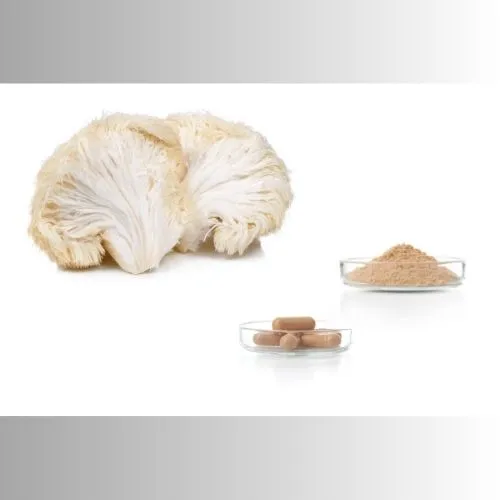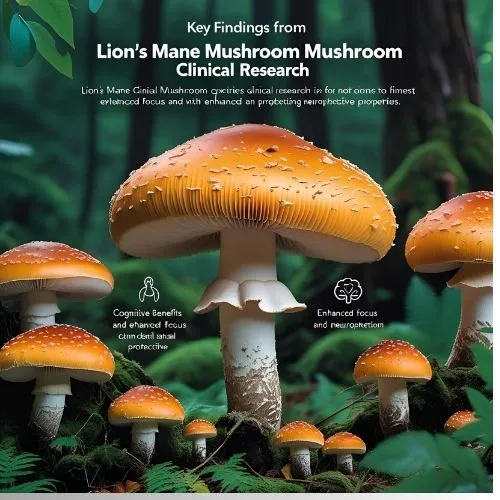What Science Says: Lion’s Mane Mushroom Clinical Studies
Lion's mane mushroom (Hericium erinaceus) has garnered significant attention in the scientific community for its potential health benefits, particularly in cognitive function and neuroprotection. This article delves into the latest clinical research on lion's mane mushroom extract, exploring its effects on brain health and cognitive performance.

Key Findings from Lion's Mane Mushroom Clinical Research
Cognitive Function Enhancement
Numerous studies have explored the effects of lion’s mane mushroom on cognitive function. One notable double-blind, placebo-controlled trial involved 30 adults experiencing mild cognitive impairment. Over 16 weeks, participants who consumed 3 grams of lion’s mane powder daily demonstrated notable improvements in cognitive abilities compared to those who received a placebo.
The study assessed cognitive function using several tests, including the Mini-Mental State Examination (MMSE) and a cognitive function scale. Results showed that the group taking lion’s mane experienced enhanced memory, focus, and overall mental clarity. These findings suggest that lion’s mane mushroom may offer promising benefits for supporting cognitive health, particularly in individuals with mild cognitive decline.
Neuroprotective Properties
Research has uncovered the neuroprotective potential of lion's mane mushroom extract. A study published in the International Journal of Molecular Sciences demonstrated that compounds found in lion's mane, specifically hericenones and erinacines, stimulated nerve growth factor (NGF) synthesis. NGF plays a crucial role in the growth, maintenance, and survival of neurons, suggesting that lion's mane could potentially mitigate neurodegenerative processes.
Mood and Anxiety Regulation
Clinical trials have also explored the effects of lion's mane on mood disorders. A 4-week study involving 30 women found that consumption of cookies containing lion's mane extract resulted in reduced symptoms of depression and anxiety compared to the placebo group. While more extensive research is needed, these findings hint at the potential of lion's mane in supporting mental well-being.

How Lion's Mane Mushroom Extract Supports Cognitive Health?
Neurotrophic Factor Stimulation
A key way lion’s mane mushroom extract supports cognitive health is by promoting the production of neurotrophic factors, especially nerve growth factor (NGF) and brain-derived neurotrophic factor (BDNF). These proteins play a crucial role in maintaining and improving brain function by encouraging the growth and survival of neurons.
NGF and BDNF are vital for neuroplasticity—the brain’s capacity to create new neural connections and adapt to new information and experiences. By enhancing neuroplasticity, lion’s mane helps improve learning, memory, and overall mental flexibility. This mechanism makes the mushroom extract a promising natural option for supporting brain health and cognitive function over time.
Antioxidant and Anti-inflammatory Effects
Lion's mane mushroom extract exhibits potent antioxidant and anti-inflammatory properties. A study published in the Journal of Agricultural and Food Chemistry found that lion's mane extract significantly reduced oxidative stress markers and pro-inflammatory cytokines in animal models. These effects may contribute to the neuroprotective benefits observed in clinical studies, as oxidative stress and inflammation are implicated in various neurodegenerative disorders.
Amyloid-β Plaque Reduction
Research has shown that lion's mane mushroom extract may help reduce the accumulation of amyloid-β plaques, a hallmark of Alzheimer's disease. An in vitro study published in Phytotherapy Research demonstrated that compounds isolated from lion's mane inhibited the formation of amyloid-β plaques and promoted the degradation of existing plaques. While human studies are needed to confirm these effects, the findings suggest a potential role for lion's mane in Alzheimer's prevention and treatment strategies.
Recent Trends in Lion's Mane Mushroom Extract Studies
Gut-Brain Axis Exploration
Emerging research is exploring the connection between lion’s mane mushroom powder and the gut-brain axis. A recent study published in the Journal of Medicinal Food examined how lion’s mane extract affects gut health and cognitive function in animal models. The findings revealed that the extract improved the composition of gut microbiota, promoting a healthier balance of beneficial bacteria.
Additionally, the study showed enhanced cognitive performance in the animals treated with lion’s mane. These results suggest that lion’s mane may support brain health not only directly but also indirectly through its positive impact on the gut microbiome. This new understanding opens promising avenues for further research into how the gut-brain axis contributes to cognitive well-being and the potential role of lion’s mane mushroom in this process.
Synergistic Effects with Other Compounds
Scientists are exploring the potential synergistic effects of combining lion's mane extract with other cognitive-enhancing compounds. A study published in the Journal of Dietary Supplements investigated the combined effects of lion's mane and bacopa monnieri on cognitive function in healthy adults. The results showed greater improvements in memory and attention compared to either compound alone, suggesting that lion's mane may enhance the efficacy of other nootropic substances.
Long-term Safety and Efficacy Studies
As interest in lion's mane mushroom extract grows, researchers are focusing on long-term safety and efficacy studies. A recent 12-month clinical trial, published in the Journal of Alzheimer's Disease, evaluated the safety and cognitive effects of daily lion's mane supplementation in older adults with mild cognitive impairment. The study found no significant adverse effects and observed sustained improvements in cognitive function over the course of the year, providing valuable data on the long-term use of lion's mane extract.

Conclusion
The growing body of clinical research on lion's mane mushroom extract presents promising evidence for its potential in supporting cognitive health and neuroprotection. From enhancing cognitive function to potentially mitigating neurodegenerative processes, lion's mane continues to captivate researchers and health enthusiasts alike. As studies progress, we may uncover even more applications for this fascinating fungus in the realm of brain health and beyond. For more information on our premium Lion's Mane Mushroom Extract and how it can benefit your products, please contact us at info@yanggebiotech.com.
References
1. Mori K, et al. Improving effects of the mushroom Yamabushitake (Hericium erinaceus) on mild cognitive impairment: a double-blind placebo-controlled clinical trial. Phytotherapy Research. 2009.
2. Li IC, et al. Neurohealth Properties of Hericium erinaceus Mycelia Enriched with Erinacines. Behavioural Neurology. 2018.
3. Nagano M, et al. Reduction of depression and anxiety by 4 weeks Hericium erinaceus intake. Biomedical Research. 2010.
4. Lai PL, et al. Neurotrophic properties of the Lion's mane medicinal mushroom, Hericium erinaceus (Higher Basidiomycetes) from Malaysia. International Journal of Medicinal Mushrooms. 2013.
5. Tsai-Teng T, et al. Erinacine A-enriched Hericium erinaceus mycelium ameliorates Alzheimer's disease-related pathologies in APPswe/PS1dE9 transgenic mice. Journal of Biomedical Science. 2016.
Based on your location and order quantity, you will have the opportunity to receive a limited time free shipping promotion!

Who we are


